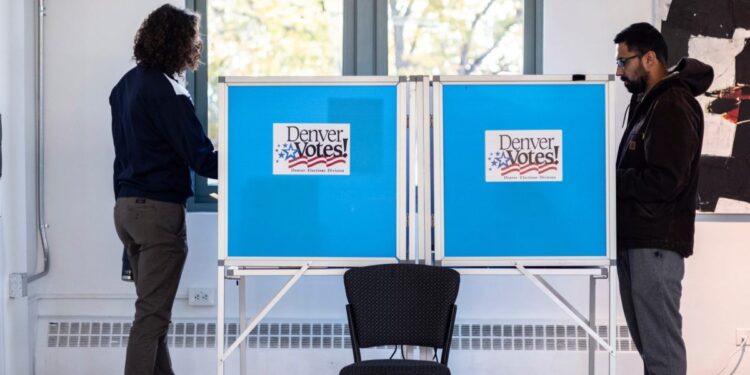Colorado voters on Tuesday brought to victory a ballot measure that will provide millions of critical dollars to organizations supporting victims of domestic and sexual violence through the creation of a new tax on firearms and ammunition.
With nearly three-quarters of the votes counted as of this morning, the measure, known as Proposition KK, passed with 54 percent of votes. When it takes effect in April, it will impose a 6.5 percent excise tax on firearms and ammunition, which will provide an estimated $39 million in annual revenue. The bulk of those funds, roughly $30 million, will go toward organizations that support victims of crimes, mostly domestic and sexual violence. The rest of the funds will support mental health services for veterans and young people, as well as increased security in Colorado public schools.
The money is especially crucial in light of the yearslong decline in federal funding from the Victims of Crime Act (VOCA), which has forced organizations that support survivors of domestic abuse to cut staff and scale back services, as I recently investigated for Mother Jones. In Colorado, the state went from receiving $31.3 million in VOCA funds in fiscal year 2017 to about $13.6 million in the most recent fiscal year, when the money was used to support more than 125,000 survivors, mostly women who were victims of domestic violence or sexual assault, according to Department of Justice data.
When we spoke last month, Roshan Kalantar, executive director of Violence Free Colorado, the statewide domestic violence coalition, told me that at least two programs in the state were on the verge of closing because of the funding cuts. Now, thanks to the passage of Prop KK, they have a lifeline that may help keep them open, she said. But the earliest the funds would be disbursed to eligible programs would be January 2026, according to a spokesperson at the Colorado Division of Criminal Justice; In the meantime, “there will be a gap and it will be difficult,” Kalantar said, adding that more federal funding cuts are expected. “We are hopeful that programs can weather this year with minimal impact.”
Democratic State Rep. Monica Duran, who introduced the bill that would become the ballot measure in the legislature earlier this year, and who is a survivor of domestic violence herself, said in a statement late Tuesday: “Tonight really is a full circle moment for me; without the support from crime victim services as a young single mother trapped in an abusive relationship, there is no way I’d be here today celebrating the passage of Prop KK.”
“As federal dollars dwindle, Coloradans made the right choice this evening to step up and help fill the funding gaps in crime victim services,” Duran continued. “From navigating the challenging judicial system to helping secure child care, crime victim services play a major role in uplifting survivors by providing them the resources they need to start anew.”
Domestic violence advocates I spoke to said that they see the new tax as particularly appropriate considering the role that firearms play in domestic violence homicides. Last year, there were 58 domestic violence fatalities in Colorado, more than three-quarters of which were caused by guns, according to state data. As Kalantar put it when we last spoke: “It feels very appropriate that people making money off the sale of guns in Colorado should participate in the healing” of survivors.
The ballot measure faced strenuous opposition from the gun lobby, who alleged the tax—which will not apply to firearms vendors that make less than $20,000 annually, law enforcement agencies, or active-duty military personnel—is unconstitutional. It could also face legal challenges, like the one facing California after the state enacted a similar measure earlier this year.







